- Region
- Vega baja
- Marina Alta
- Marina Baixa
- Alicante
- Baix Vinalopo
- Alto & Mitja Vinalopo
-
ALL TOWNS
- ALICANTE TOWNS
- Albatera
- Alfaz Del Pi
- Alicante City
- Alcoy
- Almoradi
- Benitatxell
- Bigastro
- Benferri
- Benidorm
- Calosa de Segura
- Calpe
- Catral
- Costa Blanca
- Cox
- Daya Vieja
- Denia
- Elche
- Elda
- Granja de Rocamora
- Guardamar del Segura
- Jacarilla
- Los Montesinos
- Orihuela
- Pedreguer
- Pilar de Horadada
- Playa Flamenca
- Quesada
- Rafal
- Redovan
- Rojales
- San Isidro
- Torrevieja
- Comunidad Valenciana
article_detail
Spanish News Today Editors Roundup Weekly Bulletin Dec 10
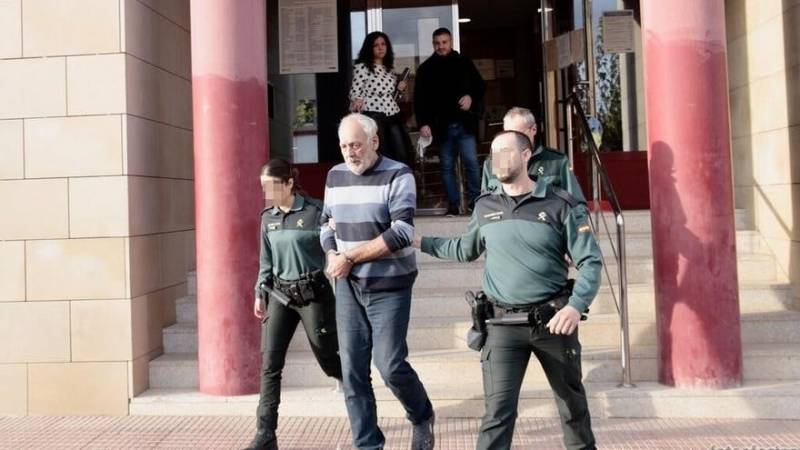
CLICK HERE FOR THE FEATURE ARTICLES "Brit living on Spain’s Camposol development arrested for alleged murder of his wife" while "Spain celebrates 44 years of democracy on Constitution Day"
It’s been a sad and shocking week for the British community in Spain after we learnt of the tragic death of one of our own at the hands of her husband, also one of our own.
At the same time, we had two bank holidays celebrating peace, harmony and the triumph of modern values, although it was piddling it down the whole time.
All this and more inside…
Tragedy on Camposol
Shockwaves were sent through the Camposol residential development in the Region of Murcia, through the British expat community in Spain, and through the population of the entire country, whatever their nationality, when a British man was arrested this week for the alleged murder of his wife, also British.
It all started during the early hours of Sunday morning, at around 1am, when neighbours on Camposol Sector D’s sleepy Calle Lecrin heard shouts and loud arguing coming from the house of a couple who 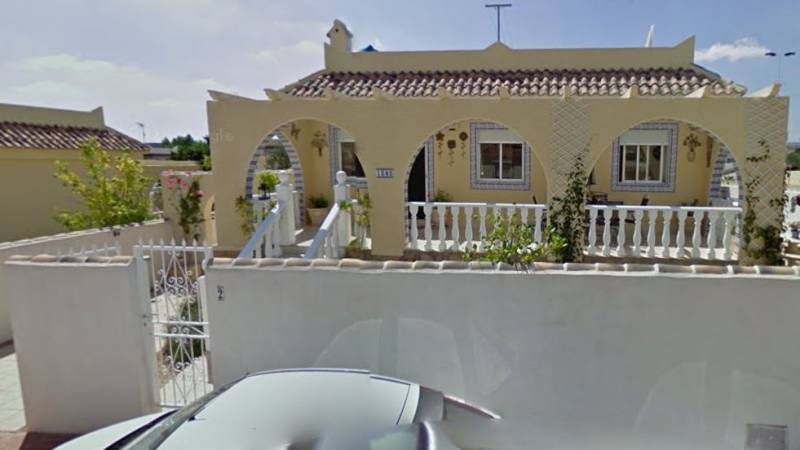 had bought the place just a few weeks before, having moved down from Caravaca in the north of the Region.
had bought the place just a few weeks before, having moved down from Caravaca in the north of the Region.
 had bought the place just a few weeks before, having moved down from Caravaca in the north of the Region.
had bought the place just a few weeks before, having moved down from Caravaca in the north of the Region.When they went round to see what was happening, neighbours say they the 56-year-old British woman lying dead outside the house with a nasty head wound. They immediately phoned the police, who came and found the woman’s partner, a 68-year-old British man, sitting in the house apparently in a state of shock.
The man was arrested and interviewed by a judge in Totana to find out exactly what happened. He denies having killed his wide, and in his version of events they were just coming back from doing the shopping when she got out of the car, tripped and banged her head on the curb, killing her. He then went inside, he says, to have a cigarette and calm his nerves.
Police don’t believe a word of it. It turns out the man already had previous charges against him for domestic violence which were filed by the woman as far back as 2007, but any restraining order had been inactive since 2014, from which point there were no more similar complaints from the victim.
What’s more, the pair had been spotted earlier in the evening in the bar area on Camposol B Sector commercial centre, and the man was said to be in a state of extreme inebriation when he was arrested, not to mention the stacks of beer cans piled outside the house.
A minute’s silence was held in memory of the poor victim by the Spanish government’s Delegate in the Region of Murcia, José Vélez, who was in Torre Pacheco on Tuesday for the gold medal award ceremony for the town’s Civil Protection Volunteer Association.
So far this year, 39 women have been murdered in Spain in so-called ‘gender violence’ attacks, and this is the second to occur in the Region of Murcia. This is also the second murder classified by Spanish police as occurring due to gender violence to be perpetrated by a Brit after the killing of a 69-year-old woman by her husband in Benalmádena barely a month ago. This means that more than 5% of gender violence murders in Spain are committed by British expats.
Faced with such horror, we cannot afford to stay silent. Lives may be at risk. Incidents such as these impress on us the vital need for victims to speak up and for everyone to speak out against domestic abuse. If you are a victim of gender violence or know someone who is, seek help immediately. In Spain, you can call the number 016, which is available 24 hours a day in 52 different languages. You can also write to the email address 016-online@igualdad.gob.es, or get help via WhatsApp on +34 600 000 016.
In an emergency situation anywhere in Spain, you can call 112 or the National Police (091) and the Civil Guard (062). If you can’t call, you can use the ALERTCOPS app, which will send an alert signal to the police with your phone’s precise geolocation.
Celebrating freedom and democracy in Spain
This week’s bank holiday on Thursday December 8 was for the occasion of the Feast of the Immaculate Conception in Spain, when Spaniards traditionally attend a special mass and honour the Virgin Mary.
The other bank holiday on Tuesday 6 was for Constitution Day, El Día de la Constitución, which is a secular holiday marking the day in 1978 when the country voted overwhelmingly in a referendum to approve the Spanish Constitution to finally bring in a democratic regime after the death of dictator General Francisco Franco three years earlier.
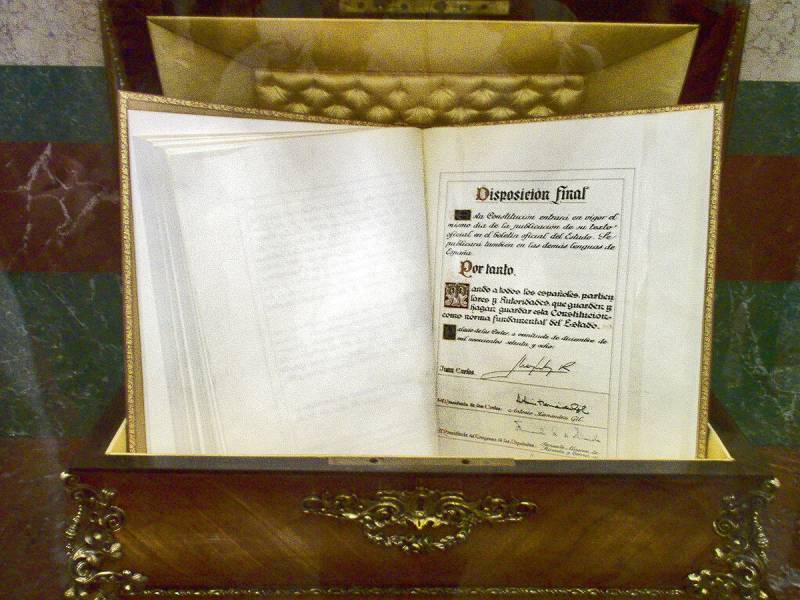
In a way, Spain’s Constitution is what made it into the modern, developed country it is today rather than a poor, autocratic outlaw on the world stage. The constitution, the original copy of which was signed by King Juan Carlos I and is now kept in the Congress building in Spain, guarantees all people in Spain “democratic co-existence under the Constitution and the law, consistent with a just social and economic order” and “peaceful relations and effective co-operation amongst all the peoples of the World”.
On the day, while we were unable to do any food shopping because loads of shops and supermarkets were closed, there were official acts to commemorate the important day, with readings from the Constitution reminding people of why it’s so important that we protect and preserve these ideals that were so hard-won 44 years ago.
Spain driving news
In another update that’s not really much of an update at all, the British Embassy in Madrid issued a statement this week reiterating that the final legal approvals are underway on the UK driving licence issue and that a formal agreement is just around the corner.
All that remains is for the resolution to be published in Spain’s Official State Bulletin (Boletín Oficial de Estado or BOE for short), after which point British nationals resident in Spain will be allowed to take to the roads once more using their UK licence. From the date of publication, motorists will have six months to swap their licence for a Spanish one without having to take a practical driving or theory test.
After the six month grace period, anyone who fails to exchange their UK licence for a Spanish one won’t be able to drive.
All of this is familiar territory. The British Embassy have also reminded people in their latest “update” that those wishing to swap their licence will have to undergo a psychophysical aptitude test. That’s not strange either, but it’s worth noting that this process has just recently been updated by the traffic authorities in Spain. The short exam is designed to test drivers’ eyesight, hearing and reactions, among other things.
Another possible fly in the ointment is that the Embassy claims that for now, the only licences that are being considered in the exchange agreement are for category B cars, although they “expect” that many  other licence categories, such as those for motorcycles and mopeds, will also be included. Well, it’s comforting to know that after countless months of this saga, they’re at the point of “expecting” rather than “hoping”.
other licence categories, such as those for motorcycles and mopeds, will also be included. Well, it’s comforting to know that after countless months of this saga, they’re at the point of “expecting” rather than “hoping”.
 other licence categories, such as those for motorcycles and mopeds, will also be included. Well, it’s comforting to know that after countless months of this saga, they’re at the point of “expecting” rather than “hoping”.
other licence categories, such as those for motorcycles and mopeds, will also be included. Well, it’s comforting to know that after countless months of this saga, they’re at the point of “expecting” rather than “hoping”.The timing for hundreds of Brit being allowed back on the road isn’t the best, however, as the Spanish government seems more determined than ever to scrap the 20 cent per litre fuel discount by the end of the year – which is just three weeks away.
In reality, the fuel bonus isn’t quite as vital as it was when it was introduced earlier this year. Petrol and diesel prices have dropped by another 3% this week and both of these fuels are now far cheaper than they were before the scheme was launched on April 1.
It’s been an ongoing threat, with those in power adamant that the fuel bonus can’t be continued indefinitely for everyone. Rather, politicians are studying ways of offering the savings scheme to more vulnerable families and perhaps professional drivers.
The Spanish Confederation of Service Station Entrepreneurs (CEEES from their Spanish initials) has criticised the government for delaying its decision until the eleventh hour and has called on the powers that be for more “certainty and dialogue” on the issue. The group has also suggested that a similar tax break to the ones on electricity and gas be applied to fuel as a compromise.
More than 20,000 new electric vehicles were registered in Spain last year (according to Statista), a figure that rises annually. This week, British Petrol (BP) capitalised on this growth with the opening of its first fast-charging station for electric vehicles in Spain in Torrevieja.
And the UK firm is all set to open a further 12 across the country before the end of the year. BP already 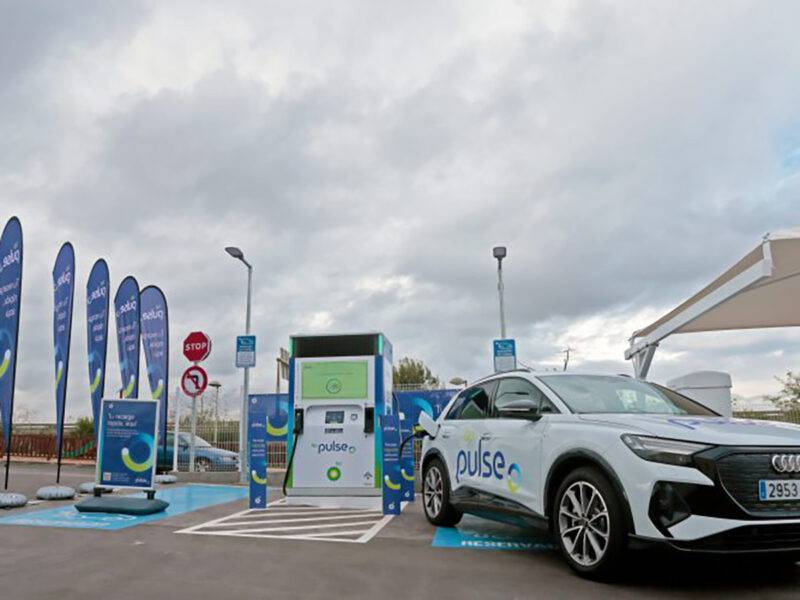 has more than 9,000 charging points on its BP pulse network, a new brand “dedicated to the development and operation of electric charging infrastructure”, according to a company statement.
has more than 9,000 charging points on its BP pulse network, a new brand “dedicated to the development and operation of electric charging infrastructure”, according to a company statement.
 has more than 9,000 charging points on its BP pulse network, a new brand “dedicated to the development and operation of electric charging infrastructure”, according to a company statement.
has more than 9,000 charging points on its BP pulse network, a new brand “dedicated to the development and operation of electric charging infrastructure”, according to a company statement.Spain’s first BP fast-charging unit is located next to the AP-7 at the La Coronelita service station in Torrevieja, and, powered by 100% renewable electricity, it can provide between 150kW and 300kW of charging power. Compatible with vehicles equipped with a CCS or CHAdeMO charging system, the station can provide a range of up to 160 kilometres in just 10 minutes, depending on the electric vehicle model.
“Milestones such as the inauguration of the first BP pulse fast charging station in Torrevieja increasingly consolidate the role of our service station network as a point of electric energy supply and allow us to continue progressing towards the goal of reaching 100,000 charging points worldwide by 2030,” said BP Spain President Andrés Guevara.
Don’t forget to join our Driving in Spain Facebook group for regular motoring and travel updates
Murcia
Last week, we reported that easyJet were competing with Ryanair and providing UK flyers more options when coming to (or going from!) the Region of Murcia by starting a new flight route between Corvera Airport and Manchester next May.
Well, now they’ve gone one step further by announcing a new London Luton-Murcia route to start on April 1 next year. This route is also already covered by Ryanair, but it does mean that there are more options for flight times/prices/more leg room and baggage allowance for passengers.
There will be the same number of flights as the Manchester route – four per week, two in each direction for the whole summer season.

As if that weren’t good enough news for Murcia-bound Brits and UK-bound Murcianos, the Manchester-Corvera route announced last week was itself brought forward by more than a month. Thus, instead of starting on May 2 they will now be brought forward to begin on March 28.
From the runway to the railway: Renfe has also made an exciting announcement, that from this December 20 they will launch four new daily high-speed AVE train trips between Murcia and Madrid.
There are two types of journeys they have announced – one that goes through Alicante, stopping in Orihuela and Elche, and which takes 3 and a half hours; and one which goes directly from the Estación del Carmen station in Murcia capital straight to Chamartín station in Madrid in just 2 hours and 40 minutes.
Tickets for these new train routes haven’t gone on sale yet, the exact schedule has yet to be formalised and no prices have been released. But it’s still a huge improvement to travel options in the out-of-the-way, largely forgotten Murcia Region, as are the new 14 Renfe Cercanías services linking Murcia and Alicante in just 52 minutes.
It seems that Renfe is doing its best to improve its customer service and provide travellers with more good news, probably because they’re scared of the newcomers on the Spanish railway scene, Ouigo and Iryo, who threaten the hegemony Renfe has had over train travel for decades.
If you’re looking for some Christmas events over the next few days, Cartagena has already switched on its Christmas lights and Christmas markets are open both in Cartagena and in Murcia capital city. Plus loads of other fun festive activities – ice-skating, toboganning, beautiful Belén nativity scenes and more!
For loads more Christmas goings on in Murcia this winter, check out our EVENTS DIARY:
Spain
Spain are out of the World Cup after being knocked out by Morocco on penalties this week. This is the second World Cup in a row that Spain have crasjed out on penalties in the Round of 16 after losing to  Russia in 2018, and it’s the furthest Morocco have ever reached in a World Cup before.
Russia in 2018, and it’s the furthest Morocco have ever reached in a World Cup before.
 Russia in 2018, and it’s the furthest Morocco have ever reached in a World Cup before.
Russia in 2018, and it’s the furthest Morocco have ever reached in a World Cup before.While Spain lick their wounds and have started looking for a replacement coach immediately, it was feared that there would be violence and disturbance from Moroccan fans. Spain has a large Moroccan community, and riot police were standing at the ready for scenes of fires and riots as had taken place in Belgium after Morocco beat them. However, while there was more rioting in Belgium and the Netherlands, it was – for the most part – calm and peaceful in Spain.
As the Spanish team flies home, negotiating one Spanish airport has just become a lot simpler. Palma de Mallorca airport has announced that passengers will no longer have to remove their liquids or electronic devices from their hand luggage when passing through security, a measure that should greatly reduce queues and delays.
The annoying ritual has been scrapped thanks to the introduction of powerful 3D scanners which give airport staff a bird’s eye of everything that’s inside luggage without having to open it. Son Sant Joan airport director Tomás Melgar explained that the change is being implemented as part of a four-year renovation plan which will see a total of 560 million euros funnelled into the Mallorca aerodrome.
Some relatively positive news for the self-employed this week as the government has finally published the finer details of the new Social Security contribution scheme that will come into force on January 1.
One of the biggest benefits of the reformed system is that anyone who registers as self-employed, or autónomo as it’s known in Spanish, between 2023 and 2025 will pay a flat rate of 80 euros per month Social Security for the first 12 months.
In addition, after the first 12 months, the newly self-employed who forecast that they will earn less than 14,000 the following year will be able to apply for a reduced quota of 160 euros during the next 36 months.
But undoubtedly the biggest change, and the biggest savings, come from the altered contribution bases. For those business owners whose income fluctuates, the new regulations will allow self-employed people to select a new contribution base every two months, which will alter their Social Security payments depending on their net income.
Finally, the Treasury has designed a handy little online quota calculator will be available to business owners that will estimate payments based on the net income level that the self-employed person has forecast.
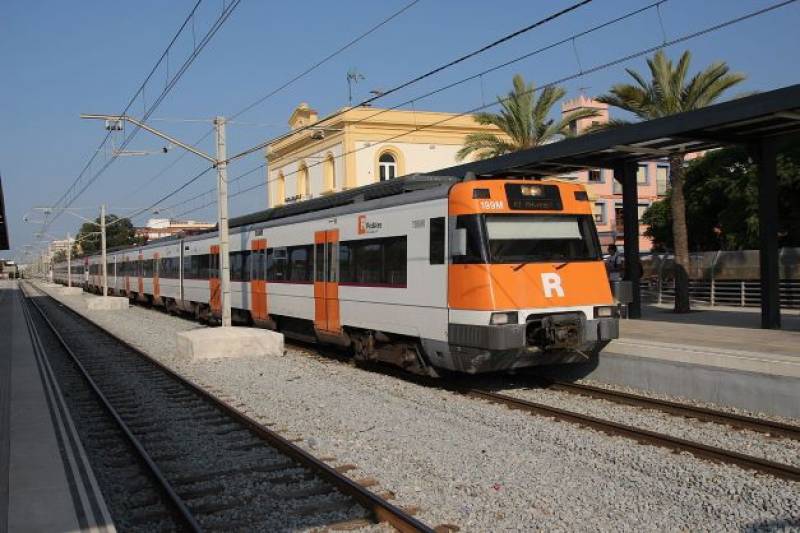 Barcelona was the scene of major disruption this Wednesday when two Rodalies trains collided at the Montcada i Reixac-Manresa station, injuring more than 150 passengers. It only took about an hour to evacuate the 1,300 travellers from both trains but major delays ensued and service on Rodalies lines R4, R7 and R12 were interrupted in both directions.
Barcelona was the scene of major disruption this Wednesday when two Rodalies trains collided at the Montcada i Reixac-Manresa station, injuring more than 150 passengers. It only took about an hour to evacuate the 1,300 travellers from both trains but major delays ensued and service on Rodalies lines R4, R7 and R12 were interrupted in both directions.In total, health personnel attended a total of 155 people for mild injuries at the scene of the accident, but only 39 were transferred to hospitals or medical centres, all of whom have since been discharged.
Railway authorities are currently investigating the cause of the crash.
Alicante
Tragedy struck an expat family on the Costa Blanca this week when an 11-year-old plunged to his death practising the daredevil sport known as parkour, or freerunning, on a hotel roof. The Norwegian schoolboy had reportedly “sneaked” into the hotel in Alfaz del Pí, forcing a padlock with a friend to get onto the roof, 50ft high, to jump from one to another. Terrifyingly, part of the roof gave way, and the child, who lived in the town 10km from Benidorm with his family, plummeted to the ground-floor reception area where he was found by a guest at the hotel.
The former registered nurse attended to the young boy until paramedics arrived and rushed him to Villajoyosa's Marina Baixa Hospital. Due to the severity of his injuries, the victim was transferred to the General University Hospital Doctor where he sadly died hours later.
Meanwhile, in the neighbouring coastal resort of Benidorm, local shops and businesses are set to get a massive 3.7 million euro boost this Christmas with the launch of the ‘Benidorm Gives You More’ campaign. Adults registered in the municipality can apply for five discount vouchers worth 10 euros each to redeem in local shops and businesses between December 15 and 31.
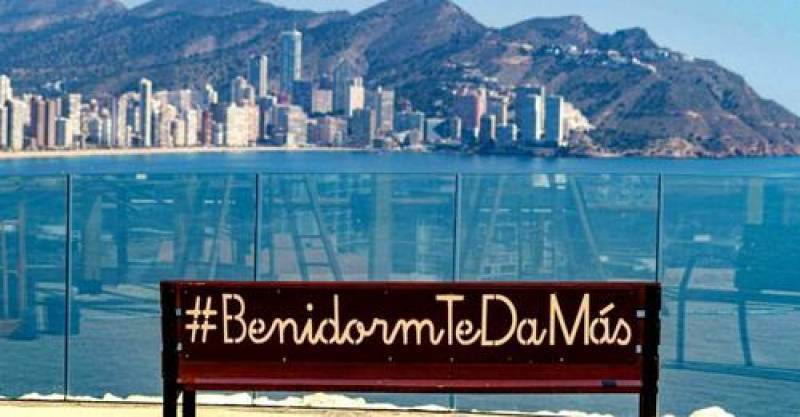
Announcing the imminent launch, mayor Toni Pérez said #BenidormTeDaMás “stimulates economic activity, achieving the double objective of helping families in a time of difficulty and doing the same with local businesses, injecting the economy and encouraging consumption”. More than 63,000 people will potentially benefit from this year’s campaign (1,540 more than last year) and a budget of 3,177,000 euros has been set aside.
“By the end of this campaign on December 31, the bonus-consumption system will have generated a turnover of more than 18 million euros in Benidorm over three editions of the voucher scheme,” said the mayor.
Andalucía
There’s just no accounting for some behaviour. Some people are just inexplicably despicable. Why would you endanger thousands of lives by selling fake oil and diesel to petrol stations just for the sake of money? Yet that’s exactly what a certain Almeria man, Emilio T., did over the course of at least four years between 2007 and 2010, diluting real diesel with lower quality oils that could potentially damage cars, and selling it to petrol stations all across the southern Spanish coast. Mr T. has now been sentenced to 14 years in prison for his fraudulent activities, with which he earned more 4.26 million euros. He has also been ordered to pay fines of 8 million euros.
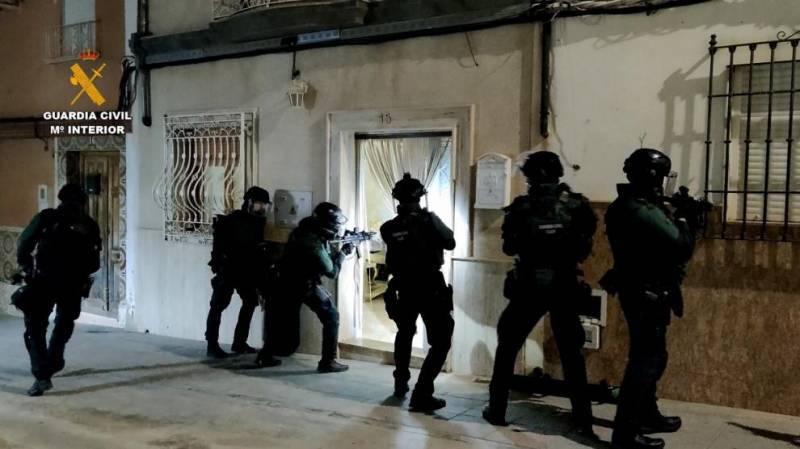 Even worse is the group of 30 or so German, Spanish, Moroccans and Ukrainians who pretended to be shipping aid to Ukraine as a front for a gang that was trafficking cannabis from several Andalucía cities. A series of police raids in Malaga, Granada, Cordoba and Seville yielded nearly 800,000 euros, six guns, GPS tracking devices and 2,500 cannabis plants.
Even worse is the group of 30 or so German, Spanish, Moroccans and Ukrainians who pretended to be shipping aid to Ukraine as a front for a gang that was trafficking cannabis from several Andalucía cities. A series of police raids in Malaga, Granada, Cordoba and Seville yielded nearly 800,000 euros, six guns, GPS tracking devices and 2,500 cannabis plants.During the busts, two of the suspects tried to flee, ramming a police vehicle and injuring two officers. They were finally arrested and additionally charged with an offence against road safety and attacking police officers.
Then there was the 26-year-old living in Estepona who is accused of murdering his own mother after she travelled from the Netherlands to see him as she was concerned for his mental health. The 61-year-old woman flew to the locality in Malaga province when a friend of her son phoned her to say that he was acting strangely and displaying violent tendencies. Worried and wanting to help as any mother would, she immediately boarded a flight from the Netherlands to be with her child.
The friend led the mother to the flat she had used to share with the disturbed young man and left the two alone to have some privacy. When neighbours raised the alarm the next day that the door was standing open, the young lady went back to the flat and found the older woman lying dead on the floor with signs of strangulation and having been bludgeoned with a heavy object. She called the police, of course, who soon picked up the son as the main suspect as he was walking along the side of the A-7 motorway towards Malaga.
On the lighter side, the Spanish Embassy in London has provoked some laughs after its effort to promote Malaga city as an attractive tourist destination to visit in Spain to go and see the Christmas lights backfired. Instead of using a picture of this year’s lights, the Embassy uploaded a photo of the Christmas lights on Calle Larios that were there back in 2017 and 2018.
Despite a user providing them with an newer photo to use, the outdated image remains on the Embassy’s profile, which is a shame considering many believe this year’s image would be much more relatable to Brits, especially those living in London. The heavenly angels that currently grace Malaga’s Calle Larios apparently bear a resemblance to the angels that have illuminated London’s Regent Street for years.
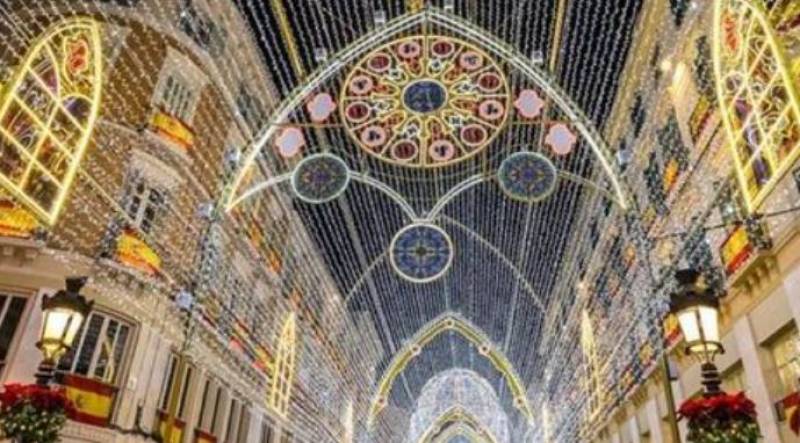
You may have missed…
- Largest illuminated Christmas ball in Spain goes up in flames in Alicante.
The biggest illuminated Christmas ball in Spain, an enormous 12-metre bauble installed in Alicante city centre, burst into flames on Thursday evening, just over a fortnight after it was unveiled. - 20-year-old British tourist found dead on Mallorca beach.
The lifeless body of a 20-year-old British man was pulled from sea in Mallorca on Tuesday morning, while notes with suicidal thoughts were found on the shore. - Largest illuminated Christmas ball in Spain goes up in flames in Alicante.
The biggest illuminated Christmas ball in Spain – an enormous 12-metre bauble installed in Alicante city centre – burst into flames this Thursday, just over a fortnight after it was unveiled. - VIDEO: Amazing rare seaspout spotted off the coast of Chiclana, Cadiz.
A spectacular seaspout, a kind of tornado rising off the water, has been seen in Chiclana, Cadiz, caused by the extremely heavy rainfall and winds battering the province. - Bullas’s Salto del Usero becomes the fifth Natural Monument in Murcia.
The Salto del Usero rock pool and waterfall in Bullas has become the fifth official Natural Monument of the Region of Murcia.
That’s all from us for this week, thanks for reading. Have a nice weekend, and we’ll be back with another instalment next time. And, just so you know, there will be two more bulletins over the next two weeks before we break up for Christmas, and we won’t be sending out a weekly roundup email on December 30 or on January 6.
For now, though, see you next week!
Got a business in Spain? Advertise with us.
Murciatoday.com and its affiliated Spain Today Online sites can help bring your business to a wider audience – over 350,000 unique readers every month. We’ll provide you with custom-made banner ads, a personalised listing in our Business Directory and special feature articles about your particular business niche.
Don’t limit yourself to the yellow pages. Get online! After Covid, can you afford not to? Contact us today to find out how we can get wider exposure for your business.
Contact Murcia Today: Editorial 000 000 000 /
Office 000 000 000


















